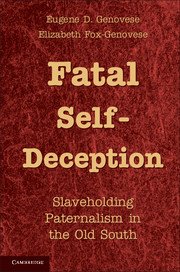Introduction
Published online by Cambridge University Press: 05 June 2012
Summary
It is natural that the oppressed should hate the oppressor. It is still more natural that the oppressor should hate his victim. Convince the master that he is doing injustice to his slave, and he at once begins to regard him with distrust and malignity.
– Chancellor William Harper of South CarolinaDecades of study have led us to a conclusion that some readers will find unpalatable: In most respects, southern slaveholders said what they meant and meant what they said. Notwithstanding self-serving rhetoric, the slaveholders did believe themselves to be defending the ramparts of Christianity, constitutional republicanism, and social order against northern and European apostasy, secularism, and social and political radicalism. Just what did slaveholders say and mean? Southerners, having measured their “domestic slavery” against other ancient and modern social systems, declared their own social system superior to alternatives and a joy to blacks as well as whites. Viewing the free states, they saw vicious Negrophobia and racial discrimination and a cruelly exploited white working class. Concluding that all labor, white and black, suffered de facto slavery or something akin to it, they proudly identified “Christian slavery” as the most humane, compassionate, and generous of social systems.
The westward movement of planter households significantly altered economic development, national politics, and southern culture. More specifically, the difficulties and hardships of emigration strengthened relations between masters and slaves and a sense of the interdependence of plantation households. In 1853, a planter with the nom de plume “Foby” decreed: “All living on the plantation, whether colored or not, are members of the same family and to be treated as such.…The servants are distinctly informed that they have to work and obey my laws, or suffer the penalty.” The master “possessed all judicial, legislative, and executive power and arrogates the settlement of disputes to himself.” With these few sentences, “Foby” depicted the master-slave relation in a paternalistic household that entailed duties, responsibilities, and privileges without denying despotism and violence. Kindness, love, and benevolence did not define paternalism, which depended on the constant threat and actuality of violence. The household, as celebrated by apologists, may often have softened attitudes and behavior, but countervailing pressures remained and often prevailed. Above all, commodity production required profit maximization, which more often than not entailed severity. Mary R. Jackman observes in The Velvet Glove, her arresting sociological study of paternalism: “The presumption of moral superiority over a group with whom one has an expropriative relationship is thus flatly incompatible with the spirit of altruistic benevolence, no matter how much affection and breast-beating accompanies it. In the analysis of unequal relations between social groups, paternalism must be distinguished from benevolence.” Jackman adds that the dominant group's characterization of subordinates as having distinct personal attributes frees superordinates to claim that the needs of the subordinates are also distinct from those of the dominant group.
- Type
- Chapter
- Information
- Fatal Self-DeceptionSlaveholding Paternalism in the Old South, pp. 1 - 5Publisher: Cambridge University PressPrint publication year: 2011

